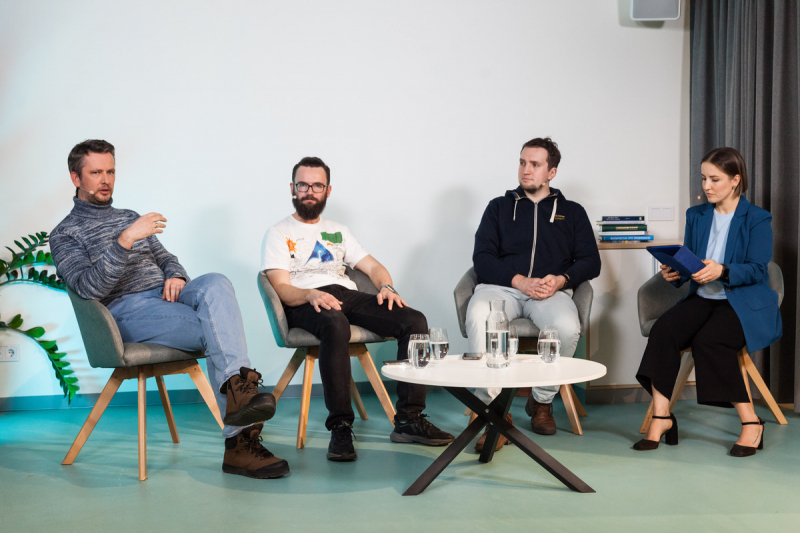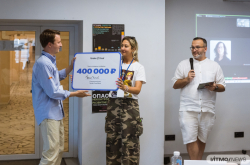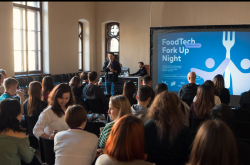Several topics were addressed at the event. First, CEO and founder of Legium.IO Ivan Khaustov, head and co-founder of CDNvideo Yaroslav Gorodetsky, and KAM/PM at Nobilis.Team Pavel Berman talked about relocating businesses, the fields that are expected to grow in these new conditions, and the most sought-after skills in IT. Then, co-founder of Otus.ru and venture partner at Fort Ross Ventures Dmitry Voloshin, co-founder of deep tech startup Dioram Vasilii Meshcheryakov, and managing partner at SoftwareLead Vitaly Yanko discussed if fledgling startupers should launch their projects and where they could secure funding.
Relocation: to move or not to move
The Russian Association for Electronic Communications (RAEC) estimates that about 50-70,000 IT specialists left the country in February-March 2022 – and this number will only grow in the future. According to other estimates, like the one by Russoft association of Russian software developers, a little over 8,000 software developers relocated in the past month.
Pavel Berman believes that the majority of those who left weren’t strongly integrated into the Russian market – such as specialists employed at international companies and mid-level programmers. Top specialists, on the other hand, still have “something to lose here” and will keep looking for opportunities in the country, adapting to the changing situations. Pavel maintains that there cannot be a universal decision about relocation, because everyone had their own unique position on the market pre-crisis. Finally, everyone has different responsibilities and personal lives that they should take into account before proceeding with drastic changes.
This position is shared by Yaroslav Gorodetsky, who has already emigrated once. In the 1990s, like many of his peers, he left the country and spent several years working at an international company before deciding to return to Russia in the 2000s to start his own business here. As a result, he was able to launch a company that went through the crises of 2008 and 2014 – and is still operating in the current conditions.
“I witnessed the fall of the Soviet Union, which also caused a major outflow of people. It was chaos, 100 times worse than it is now. But those who stayed benefited in the long run,” says Yaroslav Gorodetsky. “What you need to understand is that when you relocate, you go down the social hierarchy and you will have a much lower starting point there. This was what I learned from my emigration experience. Here you speak your own language and share the same culture with those around you. You need to realize that you will lose everything, once you move.”
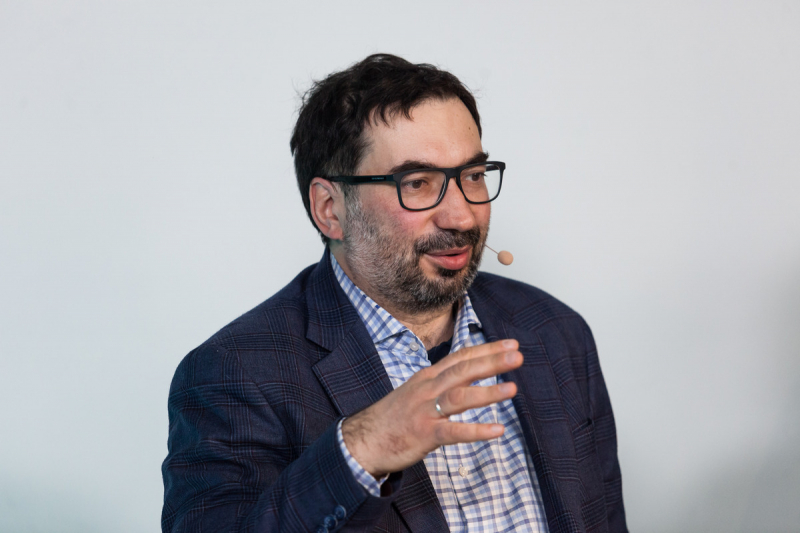
Yaroslav Gorodetsky. Photo by Maria Bakina, Megabyte Media
Before deciding to relocate, Dmitry Voloshin recommends exploring not only vacancies and salaries at particular companies, but also the local community and price range. Then, you need to perform some calculations with a cool head.
“Life is a little more complex than what you see in ads. I am in contact with many people who have relocated and there is one trend that I notice: IT specialists in Russia can afford more on their salaries here than abroad. Those who worked at major outsourcing companies here and then relocated to Europe now have the same salaries as before – more or less, depending on the exchange rate. And they have to face a big surprise in terms of the price level. My hypothesis is that half of those who left will decide to come back precisely because of this drastic decrease in the quality of life,” he states.
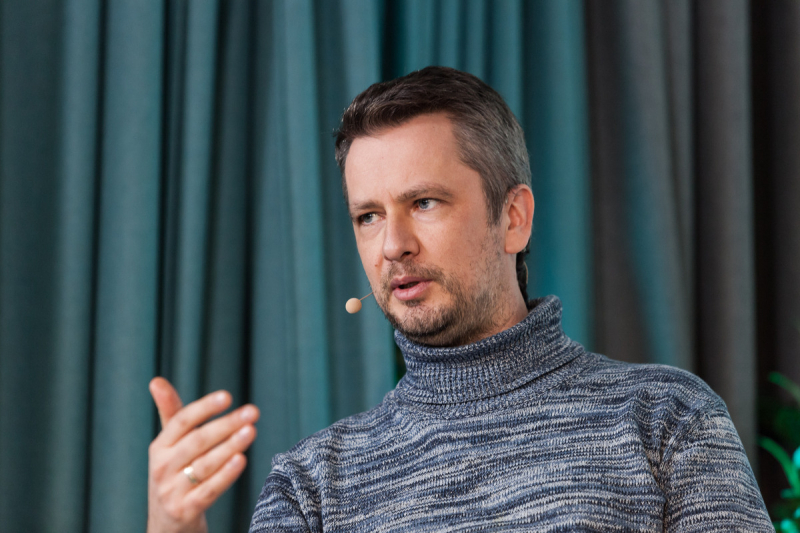
Dmitry Voloshin. Photo by Maria Bakina, Megabyte Media
Opportunities for those who stayed
HeadHunter (a Russian-based major online job search engine – Ed.) registered a surge in IT job openings in the public sector between late February and mid-March 2022. But according to Pavel Berman, companies and businesses have been hiring IT specialists for a while longer. In the future, the demand is going to only increase, as the companies will be stimulated by the need to transition to Russian-produced software. IT professionals will see it as an opportunity to advance up the career ladder more quickly – thanks to companies’ engaging all available staff resources.
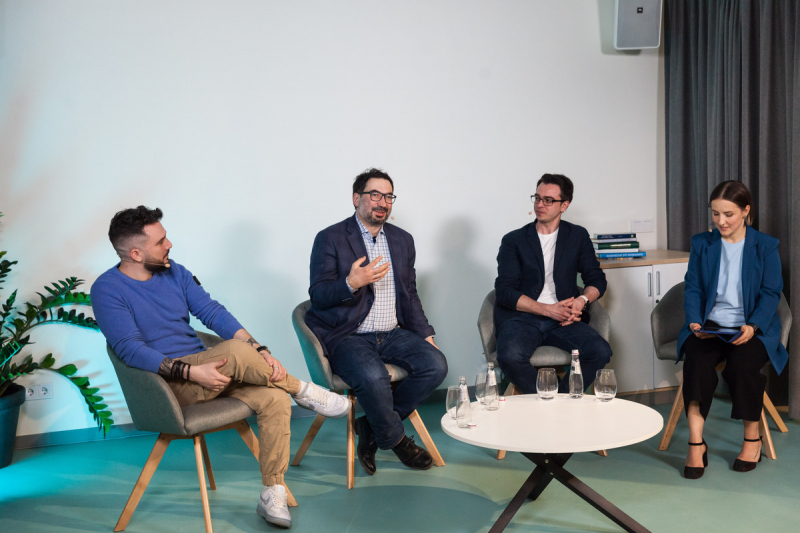
Pavel Berman, Yaroslav Gorodetsky, and Ivan Khaustov. Photo by Maria Bakina, Megabyte Media
“IT as a field is traditionally hungry for professionals – and today they are even more sought-after. We are facing major software challenges, apps, and general growth opportunities. Right now, the industry is on the lookout for new employees and the competition on the market is fierce. That’s why for current students or recent graduates it’s a chance to enter the market at the salary level that we had to earn with years of hard work before. And those employed now will get a chance to quickly advance to higher positions,” says Pavel Bergman.
Dmitry Voloshin echoes this statement, saying that IT is going to keep developing now and in the near future, because it has become an essential part for many fields. He also believes that young professionals who are only entering the market will get the opportunity to size up the market and launch a truly significant and necessary project.
“I have seen many different changes on the market and I think my vision is biased now. There are a number of old patterns circulating in my head that are skewing my predictions of what will come next. They are irrelevant now because I am sure we will see something we haven’t experienced before. That is why young minds entering the market today will have a truly great shot at noticing something that we can’t see – I am even a little envious of that. If I were to be an IT student at ITMO now together with Gennady Korotkevich, I would’ve definitely come up with some incredible project,” says Dmitry Voloshin.
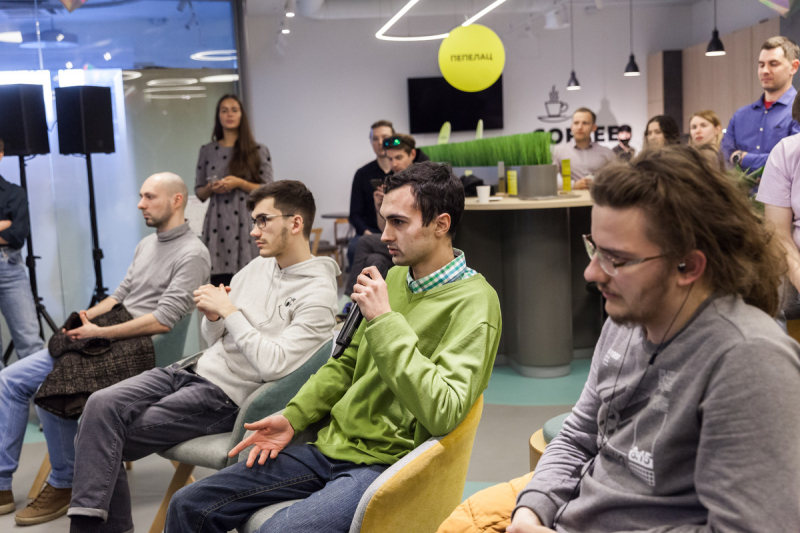
The first meetup on opportunities in a crisis at ITMO. Photo by Maria Bakina, Megabyte Media
Which industries will boom in the near future?
According to Vitaliy Yanko, not only IT but also deep tech offers countless opportunities for growth. Deep tech startups are working their way to address the vast array of challenges facing businesses and society in general. They rely on the latest advances in science and engineering and surpass current technologies. This field encompasses deep learning, robotics, drones, and even supercomputers.
“Deep technologies have the potential to take off and enter international markets. We have the opportunity to develop not only IT technologies but also applied devices. I’m talking about mechatronics. In my view, this is one of the spheres that is booming today. ITMO has united many scientists and researchers under one roof. When you’re part of the academic community and have support from the state and the university, and perhaps, corporations, too, you can develop your own fields that will address pressing scientific challenges and make breakthrough products,” says Vitaliy Yanko.
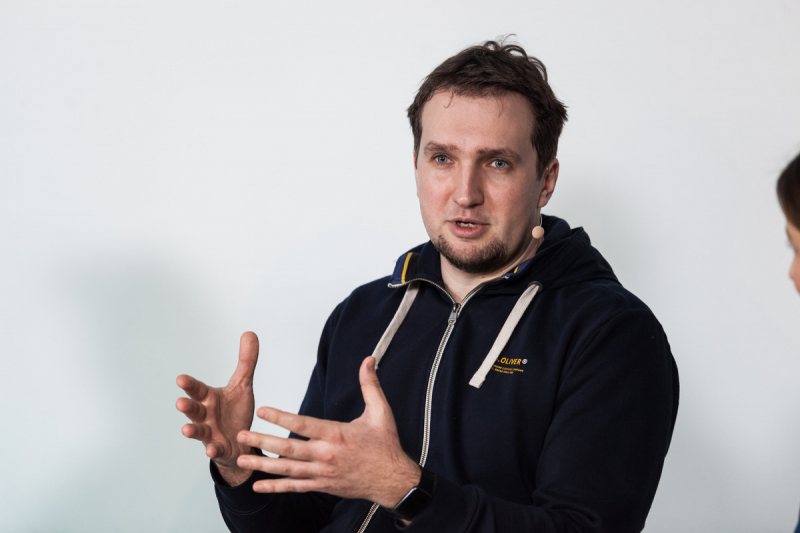
Vitaly Yanko. Photo by Maria Bakina, Megabyte Media
Ivan Khaustov agrees that despite the current demand for ideas that can solve problems here and now, businesses that have long-term goals should expect significant growth. This is proven by the fact that today’s market can already boast some solutions that help users pay for their subscriptions to various international services. However, all these startups won’t run long.
The speakers elaborated on physical and mental wellness as a vivid example of global problems. This trend skyrocketed during the pandemic, and now wellness is still important as ever. Hence, the demand for therapy and various health services only continues to increase.
And what about startups?
Vitaliy Yanko expressed a view that today’s companies have to adapt to the new reality yet they still have opportunities to grow their businesses internationally. These days, owners of startups may experience difficulties when funding investors and will have to fund their organizations using their own money. If plan A doesn’t work, the expert recommends waiting out the crisis and working for someone else till the situation gets better. Dmitry Voloshin added that all businesses, regardless of their size, will have a hard time, and startups might be replaced by companies based on the dividend growth investing business model, which are able to generate their profits and reinvest them in increasing their growth.
Another entrepreneur Vasilii Meshcheryakov believes that startups now have more opportunities for development. In addition to the fact that startups generally have fewer risks and obligations to employees and investors, they are also flexible and can take advantage of vacant niche markets that appeared after the withdrawal of other companies.
“In today’s world, whether your project will do well depends not on your hard skills but on your soft skills, that is communication, reputation, network, and brand. Only collaboration and mutual support will help you succeed in times of hardships. That’s why it’s beyond important to help others and not be afraid to ask for help when you need it,” emphasizes Vasilii Meshcheryakov.
Vasilii Meshcheryakov. Photo by Maria Bakina, Megabyte Media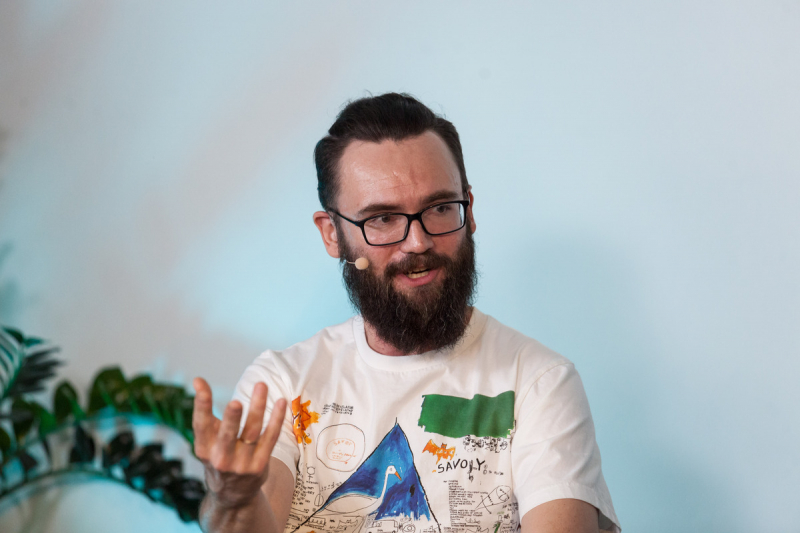
When seeking funding, the entrepreneurs recommend turning to government support that includes financial assistance for small businesses, as well as grants and subsidies from the Foundation for Assistance to Small Innovative Enterprises in Science and Technology of the Skolkovo Innovation Center. Business owners can also seek angel investors in various clubs, such as Angelsdeck, and return part of the money invested in their startup through Skolkovo's compensation program. Another way to find investors is to join an accelerator. It’s better to choose those organizations that have been on the market for years – for example, ITMO Accelerator.
Who will succeed in today’s market?
According to a study by HeadHunter, IT specialists are in most demand in Moscow (36%) and St. Petersburg (13%). The most sought-after skills that hiring employers search for in candidates (from most to less valuable) are SQL, teamwork, Git, English, Linux, Python, JavaScript, project management, and language skills. However, Pavel Berman is of the view that it’s not a good idea to stick with only one programming language or skill in the current climate. After all, to be successful in turbulent times experts have to be eager to grow and expand their horizons.
“The world is full of opportunities. Yet some people, like me, spend their Friday nights playing, say, Assassin's Creed, while others are picking up new programming skills or learning a new language. Some are experts on China, while others know a lot about the world of The Witcher. Everyone has their own motivation. Yet I suppose that we all realize that if you pay more attention to growing professionally – because you want it and not someone else – you’ll be able to reach new heights in less time, no matter if you work for a company or run our own business,” says Pavel Berman.
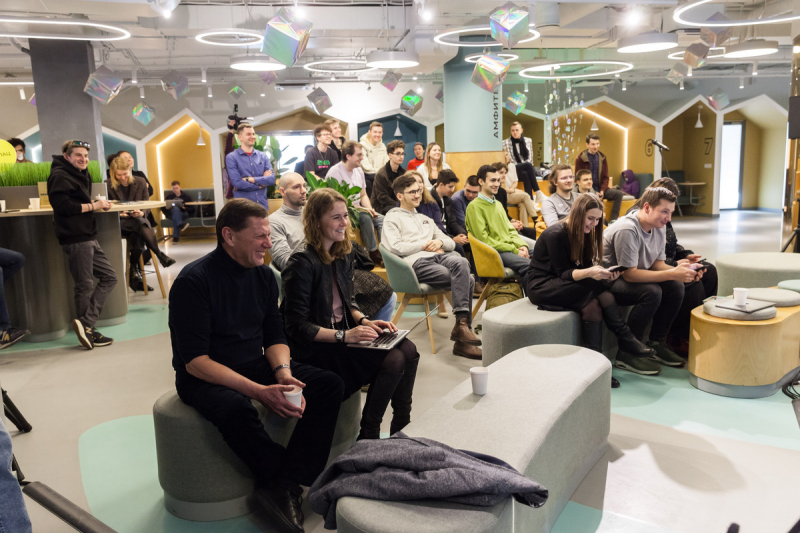
The first meetup on opportunities in a crisis at ITMO. Photo by Maria Bakina, Megabyte Media
As noted by Ivan Khaustov who finished law school and had been practicing till he opened his firm, technologies are changing as fast as legal regulations. His piece of advice for today’s professionals is to never stop learning. Following his lead, Yaroslav Gorodetsky emphasized that specialists should advance by working on applied tasks, not haphazardly studying everything.
The full recorded live stream of the meetup is available on YouTube (in Russian). The second event in the series will take place on April 4 and will bring together Ilya Chekh, the founder of Motorika (a company producing functional prostheses), an engineer, and a roboticist, and Evgeny Dzhamalov, the CEO of an international blockchain venture builder who will join in for discussion. The event will run online. Register here.
